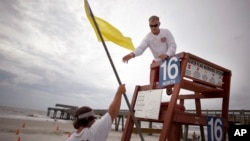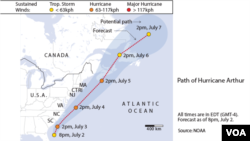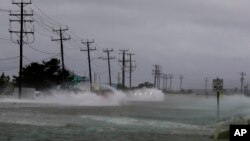The first hurricane of the Atlantic season gained strength on Thursday is expected to attain Category 2 status as it reaches the North Carolina coast, where thousands of vacationers scrubbed their July Fourth holiday plans amid evacuation orders.
“Arthur is expected to be a Category two hurricane when it passes over or near the North Carolina coast,” the U.S. National Hurricane Center (NHC) said in its latest advisory.
At 1500 GMT, the hurricane was located about 110 miles (175 kilometers) south-southwest of Cape Fear, North Carolina, with maximum sustained winds of 90 miles per hour (150 kph).
Earlier Thursday, Arthur had become the first hurricane of the 2014 Atlantic season.
The storm sparked evacuations, leading to the closing of beaches and tourist sites, and disrupted Independence Day celebrations along parts of the U.S. East Coast.
Moving faster at 10 mph (17 kph), the center of the storm is now expected to brush close to the North Carolina Outer Banks late Thursday and early Friday with winds reaching up to 105 mph (170 kph), according to the U.S. National Hurricane Center in Miami.
News reports said that as many as 500,000 visitors had been expected to pack Carolina beaches for the national holiday, the region's biggest tourist weekend.
Early warnings
Authorities had on Wednesday begun closing campgrounds, lighthouses and beaches on the Outer Banks of North Carolina. Several towns and villages rescheduled Independence Day festivities and fireworks plans as the storm picked up speed.
North Carolina Governor Pat McCrory declared a state of emergency on Wednesday for 25 eastern counties to help prepare for possible damage.
Forecasters expect Arthur to whip past the state's Outer Banks on Friday without making landfall, but McCrory warned vacationers along the coast not to risk their safety by trying to salvage their picnics, barbecues and pre-paid beach cottage vacations.
"Don't put your stupid hat on," McCrory said.
McCrory urged residents and visitors to take shelter and stay away from the water.
Addressing the media directly, he urged journalists to stay out of harm's way as they gathered information on the hurricane.
“We need the media to help inform you, but I don't want the media to pull a Dan Rather on us,” McCrory said, referring to a former network anchor who was became the first TV correspondent to report from the center of a storm in 1961.
“You don't need to prove to citizens that wind is powerful by standing out in the wind on a live shot. You don't need to stick your foot in the water to prove that waves are powerful and it can take you out in the ocean,” the governor said.
The worst of Arthur's winds were expected to remain offshore, forecasters said. But the storm could bring gusty squalls, heavy rain, life-threatening rip currents and a storm surge of up to four feet (1.2 meters) to North Carolina's barrier islands.
After passing over the Outer Banks, Arthur should accelerate toward the northeast and remain offshore on Friday as it diminishes in strength, posing no serious risk to the northeastern United States, forecasters said.
In addition to the hurricane warning, tropical storm warnings were in effect for coastal areas in South Carolina and Virginia.
The storm disrupted plans for holiday beachgoers and others ordered off low-lying barrier islands in the storm's path.
Tourists and some residents packed ferries and crowded the only highway off Ocracoke and Hatteras islands, where voluntary and mandatory evacuations were in effect in anticipation of worsening weather conditions.
Several towns and villages on North Carolina's coast rescheduled Independence Day festivities and fireworks as the storm approached.
Farther up the coast, the resort town of Ocean City, Maryland, moved its July Fourth fireworks display to Saturday because of the storm.
Boston Pops rescheduled
Boston officials also delayed a nationally televised concert by the Boston Pops and a fireworks display, which draw hundreds of thousands of spectators to the city's riverfront.
The annual outdoor concert and fireworks show, one of the city's signature events, has been moved to Thursday because of potential heavy rain ahead of the storm. Arthur is forecast to pass well east of New England beginning Friday night.
Arthur would be the first hurricane to hit the U.S. since Superstorm Sandy devastated New York and New Jersey in October 2012 and caused $70 billion estimated damage.
The storm is the first of the Atlantic hurricane season, which started on June 1 and runs through November 30.
Some information for this report provided by Reuters, AFP and AP.















